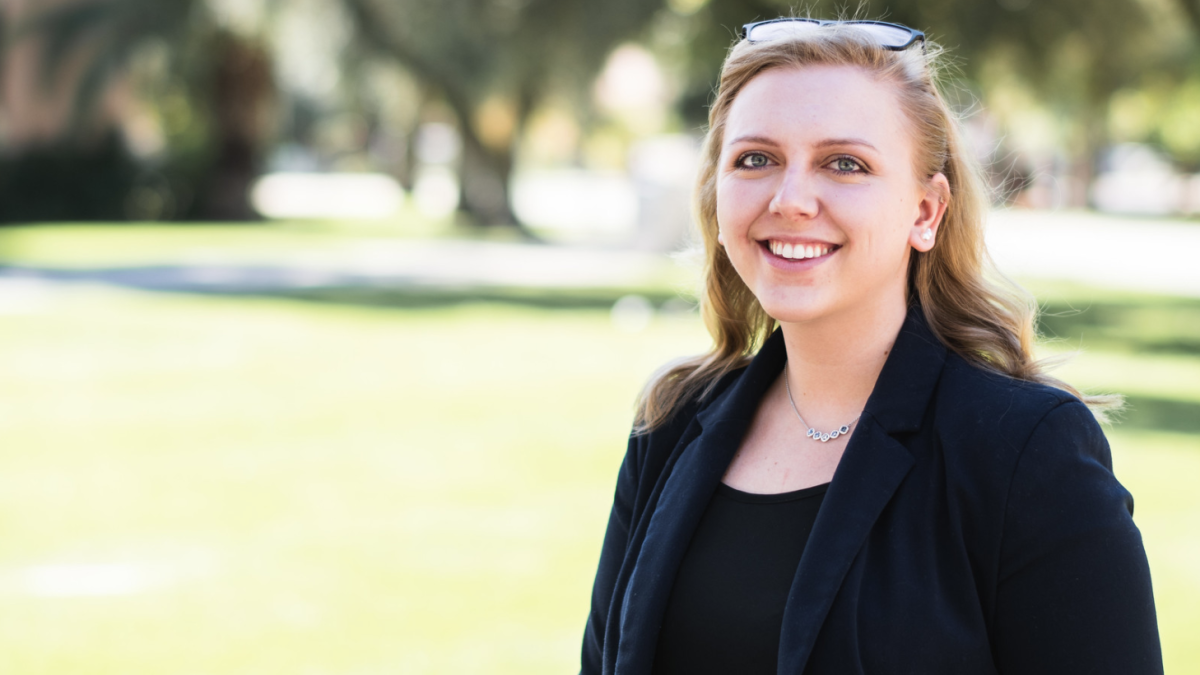East Asia studies student hopes to have international political impact

Alexandria Paterson.
Editor’s note: This is part of a series of profiles for spring 2019 commencement.
Alexandria Paterson’s desire to have a positive impact on the world goes back to when she was a young child and has continued to push her forward into becoming the Dean’s Medalist for the School of Historical, Philosophical and Religious Studies this semester.
After graduating from high school, Paterson studied abroad in South Korea through the U.S. Department of State’s National Security Language Initiative for Youth program. The program is part of the initiative launched in 2006 to improve Americans' ability to engage with people from around the world.
“The experience living in a foreign country had opened my eyes to the possibilities outside of life in the United States as well as the influence our culture has on other countries,” said Paterson. “My goal was to go to school and study to become a diplomat, so I could be an ambassador for the United States and have a positive impact on the world.”
The Cary, North Carolina, native continued to look away from home and joined Arizona State University to earn her bachelor’s in East Asia studies along with a minor in political science and a certificate in Korean studies.
Paterson will be graduating this May. We asked her a few questions about her time at ASU.
Question: What was your “aha” moment, when you realized you wanted to study the field you majored in?
Answer: I guess you could say my "aha" moment was when I came back from my time studying abroad in South Korea after high school. I realized that I wasn't content staying in one place my entire life and wanted to move to Arizona to expand my horizons and see what opportunities I could take advantage of to make some real beneficial change.
Q: What’s something you learned while at ASU — in the classroom or otherwise — that surprised you, that changed your perspective?
A: I learned that no matter what your interests or field of study, there will always be someone else who shares them with you. The benefit of being at such a large school is that it's easy to find your niche; whether it's dance, language, race cars or philanthropy, there's something for everyone at ASU. The cultural and academic diversity on campus makes for endless possibilities.
Q: Why did you choose ASU?
A: I chose ASU because it was a change of scenery for me and had a wide range of classes that sparked my interest and could broaden my education. Not only did it offer an expansive selection of academic options, but it had attentive faculty that gave it a small school feel despite its large student body. There's always something going on in Tempe and there's never a dull moment on ASU campus.
Q: Which professor taught you the most important lesson while at ASU?
A: The person at ASU that taught me the most important lesson was an academic adviser. Michael Currey took a lot of time to help me each semester to create a schedule for classes that we could only describe as an "Easter egg hunt" for an obscure major, which made my time at ASU go much more smoothly than if I were on my own. Individualized attention and clear communication were the most valuable skills I learned, from him in particular.
Q: What’s the best piece of advice you’d give to those still in school?
A: Don’t think about “what” you want to do, but rather “why” you want to do it. You might like the sound of something, and then commit the next 40 to 50 years of your life doing something it turns out you hate. Rather, consider the type of lifestyle you want to live. Do you want a family? Do you want a nice house? Would you like to travel? Do you want to help people and make an impact? You need to reverse engineer your life and make your decisions based on the results you will get, rather than dedicating your life to something that won’t allow you to live the way you desire in the long term.
Q: What was your favorite spot on campus, whether for studying, meeting friends or just thinking about life?
A: My favorite spot on campus was outside of the Starbucks near the Discovery building, near the big fountain. It's a nice place to spend time with friends or study for class.
Q: What are your plans after graduation?
A: I would like to pursue business or international politics after I graduate. Living abroad and representing the United States or working with startup companies that have the goal of improving the environment or community to create a brighter and healthier future for our families would have the most meaning to me.
Q: If someone gave you $40 million to solve one problem on our planet, what would you tackle?
A: I would fund companies that focus on turning waste into usable energy to reduce the area of land used for dumping grounds as well as reduce the amount of methane and carbon emissions released into the atmosphere.
More Law, journalism and politics

TechTainment conference explores the crossroads of law, technology, entertainment
What protections do writers, actors, producers and others have from AI? Will changing laws around name, image and likeness (…

How to watch an election
Every election night, adrenaline pumps through newsrooms across the country as journalists take the pulse of democracy. We…
Law experts, students gather to celebrate ASU Indian Legal Program
Although she's achieved much in Washington, D.C., Mikaela Bledsoe Downes’ education is bringing her closer to her intended…